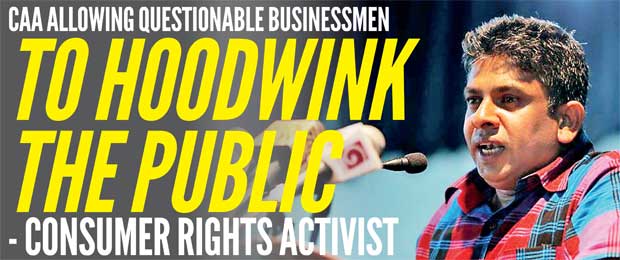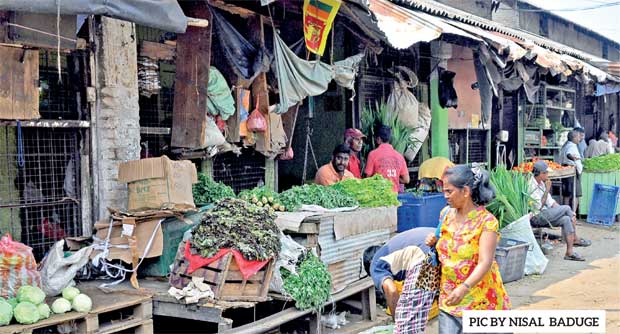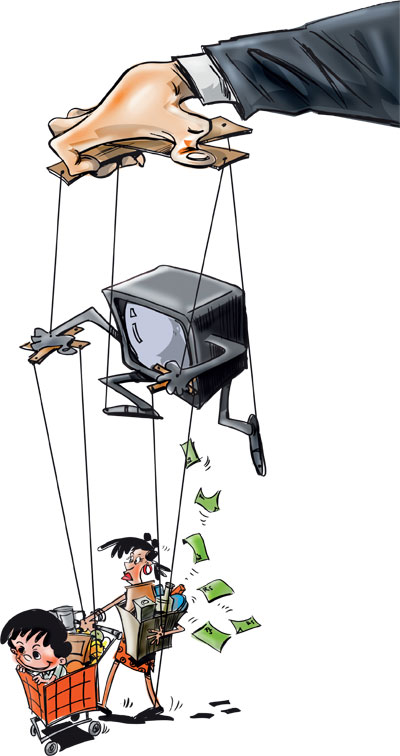22 Jun 2017 - {{hitsCtrl.values.hits}}

National Movement for Consumer Rights Protection was established in 2007 with the purposes of making sure that the fundamental rights of all consumers are upheld and protected by the government and corporations and fighting against violations of consumer rights.
 In an interview with the Daily Mirror, the Chairman of the National Movement for Consumer Rights Protection, Ranjith Vithanage discussed about the plastic rice scare, increasing number of sub-standard imported cosmetics in the market, unregulated and unhealthy advertising and marketing of products and the matters relating to the food safety issue in Sri Lanka.
In an interview with the Daily Mirror, the Chairman of the National Movement for Consumer Rights Protection, Ranjith Vithanage discussed about the plastic rice scare, increasing number of sub-standard imported cosmetics in the market, unregulated and unhealthy advertising and marketing of products and the matters relating to the food safety issue in Sri Lanka.
Q Sri Lankan consumers were scared of reports about plastic rice. Any responsible party from the government didn’t even bother to talk about it and make the people aware. What is your take on the whole plastic rice issue?
There is nothing like plastic rice. This story is based on rumours. How can we have credibility on rumours? The discussion about plastic rice began after a video where some people had made balls from cooked Basmati rice which bounced off hard surfaces. They claimed as if the rice balls were originally made of rubber or plastic. Not only that, some other videos showed polythene being melted into plastic sticks which are then cut into rice grain look-alike pieces. As far as I am concerned, the story about plastic rice was first reported in China. The price of plastic is quite expensive. If rice grains are really made from plastic, then the price of that rice should also be high. According to my self study, there is no credible evidence to believe about the existence of plastic rice.
As I have not done a proper scientific test, I am not asking people not to panic. The best solution is in the hands of the Health Ministry, who can carry out a proper scientific test about the reports of plastic rice and issue an official statement so that these reports will be proven to be true or false. Further actions can be taken by the government thereafter. People will be confident about such official statement about the issue.

Q Lanka Sathosa Chairman T.M.K.B. Tennakoon had told a newspaper that the discussion about plastic rice was created by a group, which is against imported Basmati rice.
 It can neither be 100 percent true nor false. Apart from the political gains, there are economical and financial gains for certain groups from the plastic rice issue. Economically, the demand for the imported Basmati rice will reduce due to such reports and people will fear to buy them. As people will tend to buy alternatives, consequently the demand for local rice categories and wheat flour will go high. It has happened already. The price of Nadu rice has gone up to Rs.110. Before the plastic rice discussion, Nadu was sold at Rs.80.
It can neither be 100 percent true nor false. Apart from the political gains, there are economical and financial gains for certain groups from the plastic rice issue. Economically, the demand for the imported Basmati rice will reduce due to such reports and people will fear to buy them. As people will tend to buy alternatives, consequently the demand for local rice categories and wheat flour will go high. It has happened already. The price of Nadu rice has gone up to Rs.110. Before the plastic rice discussion, Nadu was sold at Rs.80.
Q Even though there is a National Medicines Regulatory Authority (NMRA), there are many low quality cosmetics in the market. Several deaths have also been reported due to severe allergic reactions to some cosmetic products. Do you think the NMRA plays their role properly?
The NMRA was established under Cosmetic Devices & Drugs (CDD) Act No 27 of 1980. It claims that it tests samples of cosmetics products of all the companies operating in the country, before releasing them to the market. If it properly happens as they claim, such deaths would not have happened. Nowadays, anyone can import cosmetics without any barrier. None of the cosmetics that are imported to Sri Lanka are properly monitored. It is not compulsory for them to be registered also.
We see a big mafia is within the NMRA. Some companies could bribe the NMRA officials in order to get their
products released.
Q What should be done to change the current situation?
An independent commission should be established to observe manufacturing and selling of local cosmetics and to thoroughly monitor the imported cosmetic products.
Q Advertising is taking over many fields. Do you see a change in the needs and wants of people as a result of massive advertising and marketing?
Yes, there is an obvious change in people’s needs as a result of unhealthy advertising. People are brain-washed. It is not what people really need that they buy. For an example, a person goes to the super market with a list of goods that he or she needs to buy. But, in many instances, they buy unnecessary stuff instead of those in the list after being influenced by advertising, marketing and promotion. When any famous person recommends some product, our people don’t think twice to buy it. There is no government institution to regulate advertisements. Especially, advertisements regarding food products should be systematically monitored. A board of doctors has to be there to analyse production and manufacturing of food items. As we talk about these issues, many media institutions don’t take interviews from us. If they do, they will have to publish my remarks which are against advertising what the media is relying on.
Q How is the level of public awareness in Sri Lanka about consumer rights?
Actually, the Consumer Affairs Authority (CAA) is fully responsible for this. What the CAA does is allowing fraudulent businessmen to hoodwink the public. There are 411 consumer rights organisations in the country. Unfortunately, none of them are functioning. The ministry is holding awareness programmes only on the World Consumer Rights Day. Such programmes should not be limited for one day.
Such awareness programmes should be constantly carried out throughout the country in regional level. New technological methods should be utilised for the programmes. It will be very useful if they can make people aware about food standards and
consumer rights.
As far as I am concerned, the story about plastic rice was first reported in China. If rice grains are really made from plastic, then the price of that rice should be high. There is no credible evidence to believe about the existence of plastic rice
Q You just levelled a charge against the CAA, saying the institution allows fraudulent businessmen to hoodwink the public.
Yes. We have people there. We are sure that some CAA officials make deals with businessmen for money. When money matters, terms like food safety and public betterment are forgotten for such officials. There is no point in carrying out awareness programmes for the sake of doing it. The government should create and maintain a consumer network throughout
the country.
Q Raids are often being carried out and large stocks of goods unsuitable for human consumption are often found. Is there a decrease in the number of instances where sub-standard goods are found?
It is a very critical and interesting topic. These raids are merely media shows. Companies found to be importing sub-standard goods are not facing further legal actions if they can spend some money and bribe raid officials. Only small scale companies go under legal actions as they fail to satisfy the relevant officials. As long such officers are there to make such institutions corrupt, the number of instances where such sub-standard goods are found will not decrease.
Q From your perspective, how have the challenges of ensuring food safety changed over the past decade in Sri Lanka?
As the sourcing of food today is globalising, the challenge of ensuring food safety is becoming more difficult. It has already and will enlarge the scope of risks that we have to take into account in our evaluation. And, nowadays there are chemicals which we have not even heard about in the past.
But, it is a pleasure to say that when comparing to the past decades, consumers are more aware of food safety issues. There is no doubt that the gratitude should go to the media that had helped to quickly spread news and information about unsafe foods.
The government plays the biggest role in strengthening food safety systems in order to uplift the current level of food safety in the country. It has to be fully vigilant about instances where the general public get caught in the food fraud

Q How big is the problem of food fraud, and how can consumers verify the integrity of the food products they purchase?
The government plays the biggest role in strengthening food safety systems in order to uplift the current level of food safety in the country. It has to be fully vigilant about instances where the general public get caught in the food fraud. As the scope of the problem is enormous, laws should be introduced to curb the food fraud. Addressing the problem is very difficult in Sri Lanka because there are no nationally accepted criteria to be followed. The number of products for one particular food category is immensely increasing. There is the Sri Lanka Standards Institution (SLS) to issue the standards to products. However, testing, certification and verification of food safety by independent testing agencies is very important. Primarily, it is the right and also the duty of consumers to know whether the foods that they eat include necessary ingredients and go with the accepted standards. In the meantime, it is the responsibility of producers and suppliers too, to maintain their own efforts to improve food standards labelling practices so that it will be easy for consumers to make informed choices.
30 Oct 2024 34 minute ago
30 Oct 2024 40 minute ago
30 Oct 2024 45 minute ago
30 Oct 2024 2 hours ago
30 Oct 2024 2 hours ago